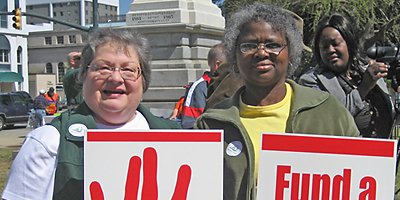
 COLUMBIA— Catholics and other Christian denominations are calling for Gov. Nikki Haley and S.C. legislators to pass a moral budget that addresses the needs of the poor and vulnerable despite tough economic times.
COLUMBIA— Catholics and other Christian denominations are calling for Gov. Nikki Haley and S.C. legislators to pass a moral budget that addresses the needs of the poor and vulnerable despite tough economic times.
An anticipated $700 million shortfall in the state budget this year has led lawmakers to consider deep cuts to public education, Medicaid, and other state programs that mostly serve children, the poor, elderly and disabled.
The S.C. Christian Action Council, with members from 16 different denominations including Roman Catholics, has joined other state organizations to urge legislators to embrace “broad and fair tax reform.” They said needed revenue could be raised by eliminating certain tax exemptions.
Father C. Alexander McDonald, a council board member, said he was pleased to see a crowd of about 2,000 people at a March 12 rally at the S.C. Statehouse in Columbia.
“It was evident to me that voices were being added to the debate on behalf of the poor and for the young people of our state,” he said. “The Gospel echoed by church social teaching calls us, if necessary, to be generous and sacrificial on their behalf. I pray that concern shapes the debate in the Statehouse.”
Bishop Robert E. Guglielmone and other U.S. Catholic bishops have expressed concern about budgeting priorities at state and federal levels.
In February, representatives from the United States Conference of Catholic Bishops and Catholic Relief Services sent letters to Congress addressing the issue.
“Calling for a moral budget is nothing more than saying to the legislators that we want you to reflect very, very carefully on how you can present a budget that is going to be realistic and just and fair,” Bishop Guglielmone said. “We need to ask if we are putting people first or dollars first.”
The bishop said it is especially alarming that education always seems to be on the chopping block.
“Education is and should be a priority for the state,” he said. “I don’t know how anybody can say that’s not critical, especially in a state that has a reputation for struggling when it comes to education.”
Father McDonald, pastor of St. John Neumann Church in Columbia, said lawmakers must find a way to combine fiscal responsibility with strong moral principles.
“One of the tests of a society’s health is how it treats its most vulnerable members,” he said.
The Rev. Brenda Kneece, executive minister of the action council, said they have worked with a coalition of non-profit organizations to create ideas on how lawmakers can address the shortfall with a morally acceptable budget.
One suggestion, she said, is to reexamine the list of 80 current sales tax exemptions and 133 user tax exemptions to seek new sources of revenue.
“We believe that sales tax exemptions should remain for prescription medication, food items, and textbooks,” she said. The rest should be judged on whether they serve the common ground or just pad and protect the pockets of a few.
“We believe that as long as we’re faithful to the principles of Jesus, we’re in the right boat,” Kneece said. “As people of faith, we can’t let the ones at risk stand alone.”
